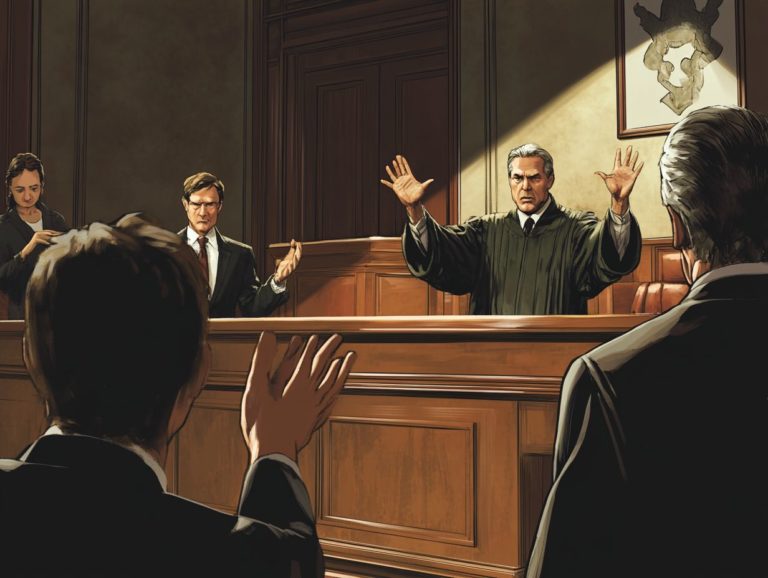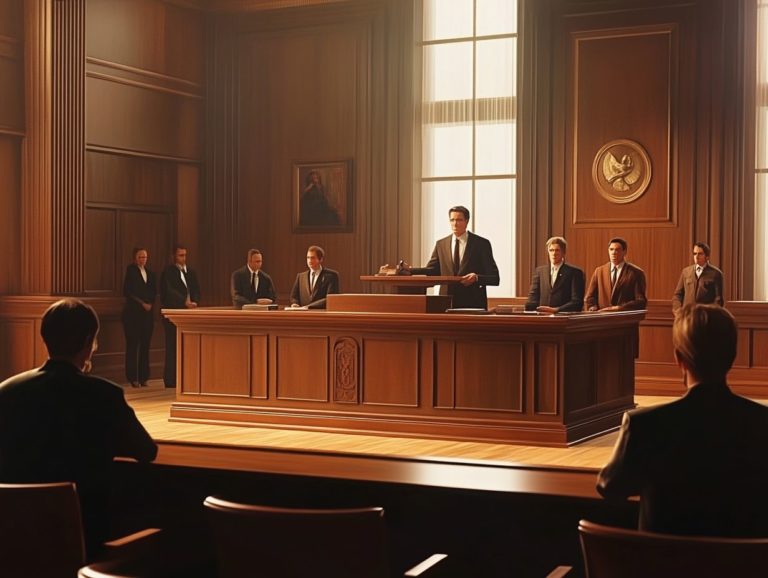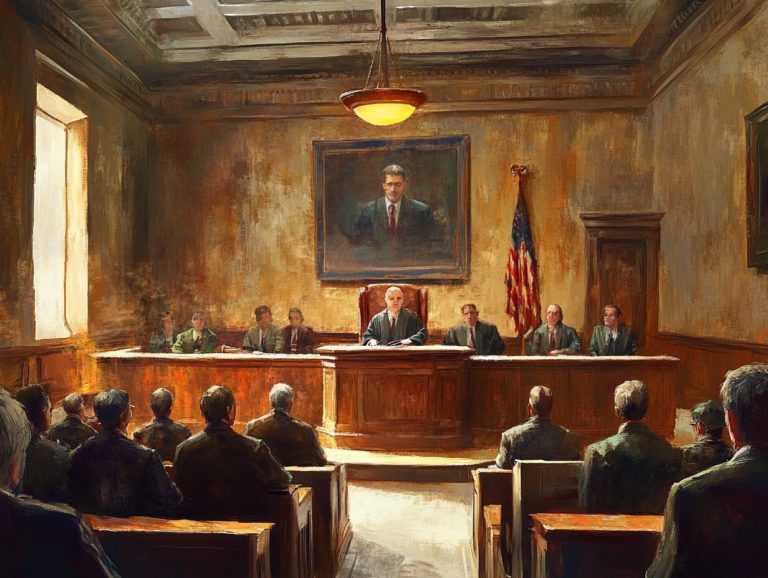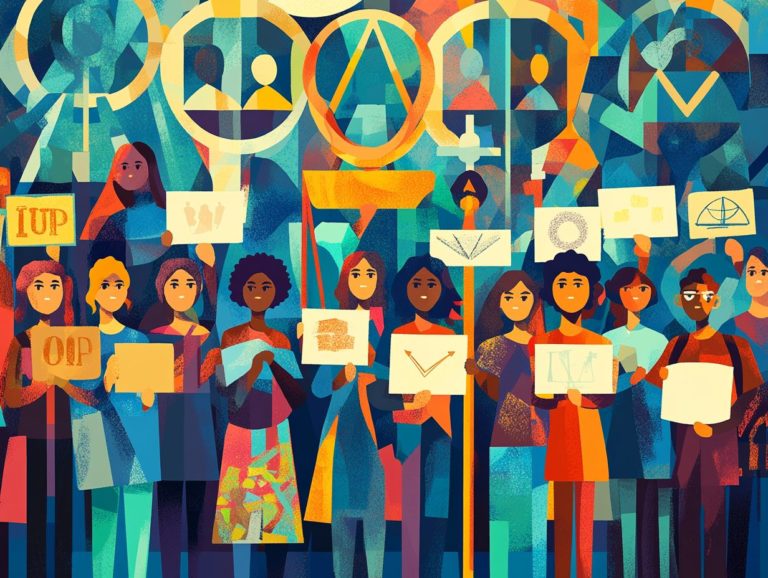Your Rights Under the Constitution
The Constitution stands as the cornerstone of American democracy, establishing the framework for governance while safeguarding individual liberties.
This article delves into the essence of the Constitution, illustrating how it protects your rights through the Bill of Rights and significant amendments. It highlights the crucial role of government in maintaining these protections.
You ll also uncover common misconceptions and get practical tips on how to actively advocate for your rights.
Join us on an exciting journey to explore this fundamental topic!
Contents
- Key Takeaways:
- Overview of the Constitution
- Understanding Your Rights
- Protecting Your Rights
- Common Misconceptions About Constitutional Rights
- Exercising Your Rights
- Frequently Asked Questions
- What is the Constitution and why is it important?
- What are my rights under the Constitution?
- What is the Bill of Rights?
- Can my rights under the Constitution ever be taken away?
- How can I exercise my rights under the Constitution?
- What should I do if I feel my rights under the Constitution have been violated?
Key Takeaways:
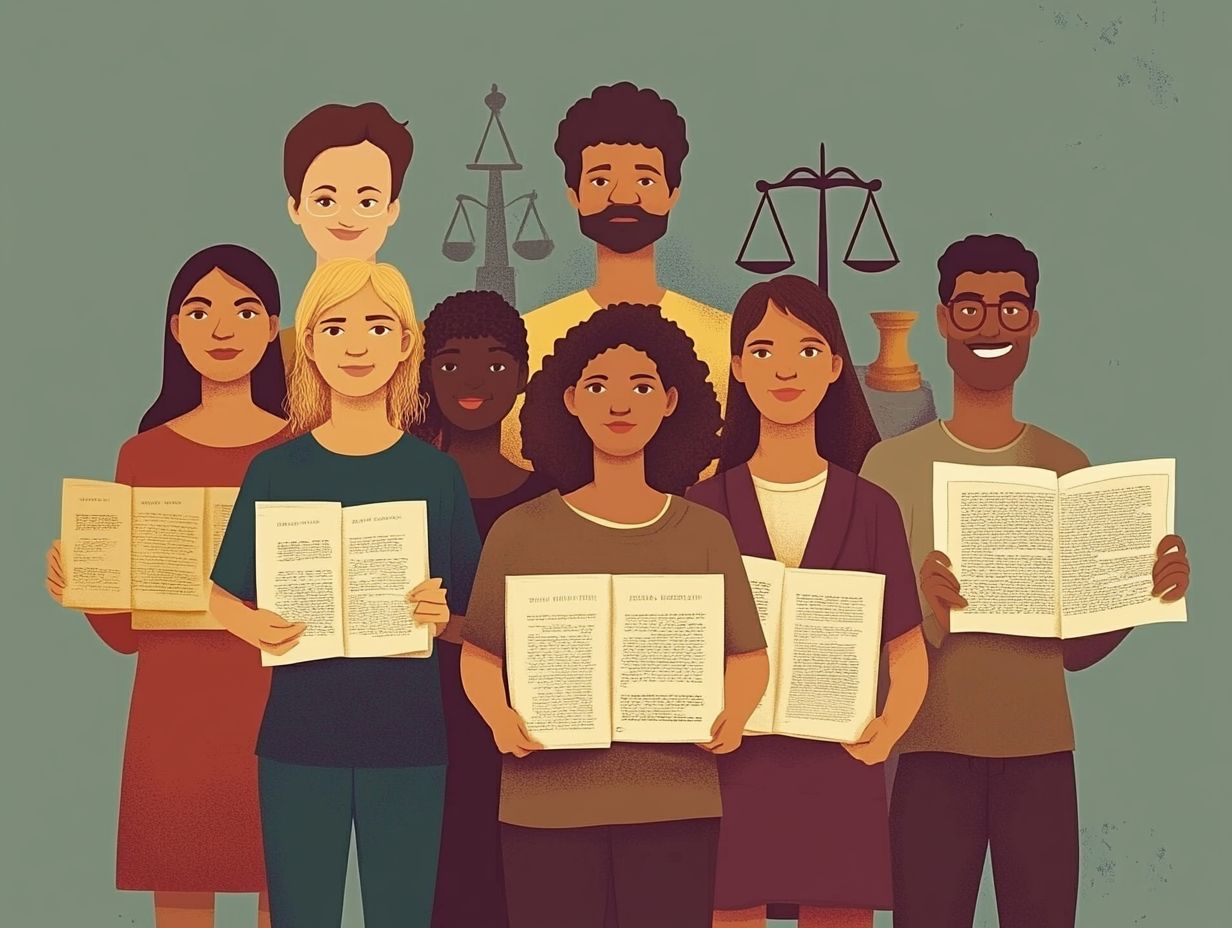
- The Constitution provides the basic framework for the US government.
- The Bill of Rights guarantees individual rights, including freedom of speech and religion.
- Citizens can advocate for their rights through peaceful actions.
Overview of the Constitution
The Constitution of the United States stands as the cornerstone of legal governance in your nation, establishing the framework for both government and law. It embodies the principles of checks and balances that were hotly debated during the ratification process in 1787.
Crafted in Philadelphia, the Constitution defines the roles of various branches of government. It also safeguards civil rights and individual liberties through its amendments.
This remarkable document emerged from a confluence of differing proposals, including the Virginia Plan and the New Jersey Plan. This ultimately resulted in the Great Compromise that defined the structure of Congress.
What is the Constitution?
The Constitution stands as a foundational document that outlines the structure, functions, and limitations of government while articulating the rights of its citizens. This remarkable text not only forms the bedrock of American governance but also embodies the vision of its framers, as succinctly expressed in the preamble, which eloquently outlines the purposes of government.
The articles meticulously outline the various branches executive, legislative, and judicial alongside their respective roles and interactions. Meanwhile, the amendments capture the evolving nature of American society, addressing crucial issues such as civil rights and liberties.
Each part is crucial for a balanced system. It promotes justice and protects freedoms that define our nation s identity.
Understanding Your Rights
Grasping your rights is essential for successfully navigating the intricate legal landscape of the United States. The Bill of Rights stands as the cornerstone of civil liberties, providing vital protections that ensure fundamental freedoms for every citizen.
Bill of Rights
The Bill of Rights, comprised of the first ten amendments to the Constitution, explicitly enumerates essential protections for your rights, including the freedoms of speech, religion, and assembly guaranteed by the First Amendment.
These amendments were born out of a history steeped in colonial oppression and driven by a fervent desire to ensure that the new government would respect individual liberties. Each amendment acts as a safeguard against potential government overreach, with the Second Amendment defending your right to bear arms and the Fourth Amendment prohibiting unreasonable searches and seizures.
The Ninth Amendment is particularly noteworthy; it underscores that just because certain rights are explicitly listed does not mean that others do not exist, reinforcing the broader notion of individual freedom.
This foundational set of amendments is a testament to a commitment to liberty and justice, firmly establishing itself as a cornerstone of American democracy.
Ready to learn more about your rights? Let s dive in!
Other Important Amendments
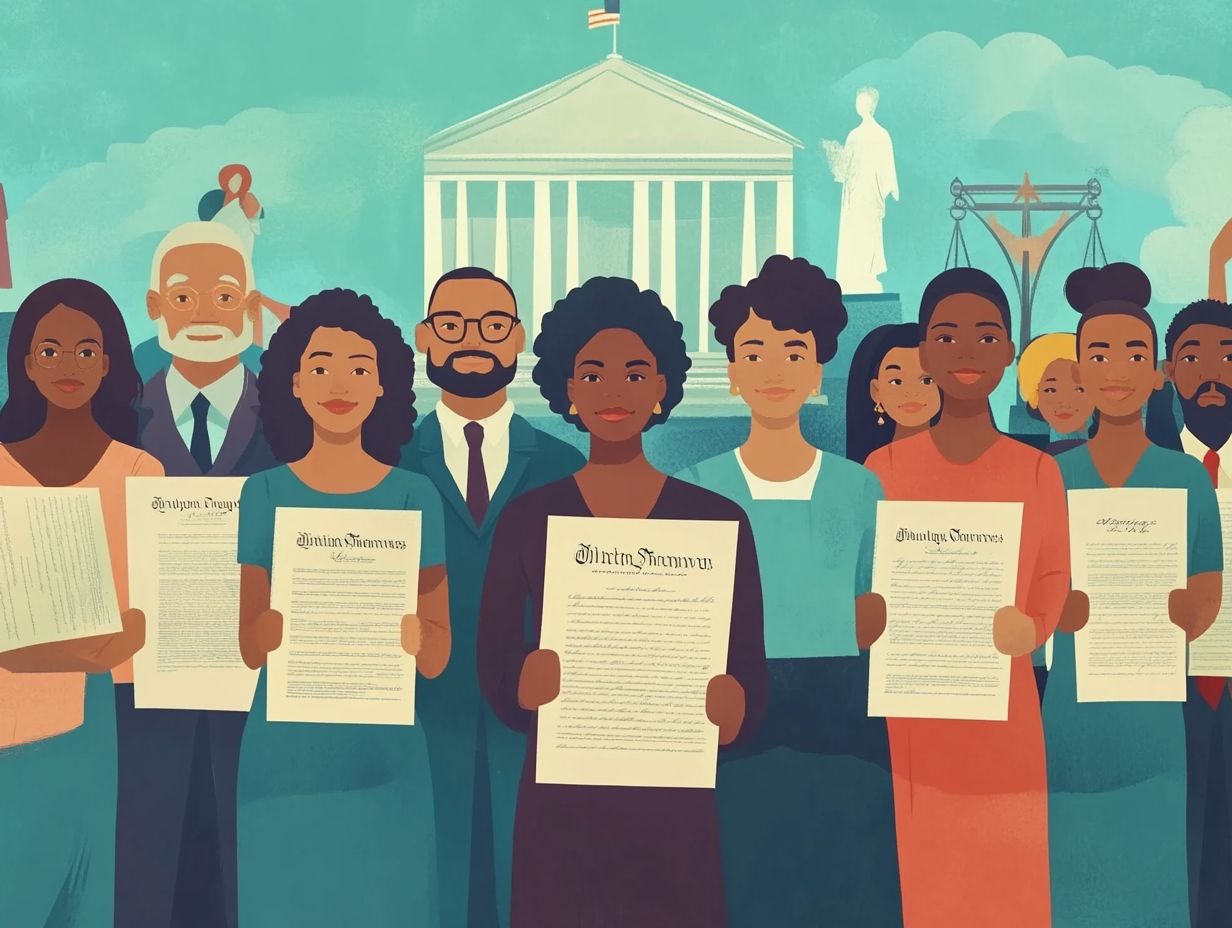
Alongside the Bill of Rights, numerous other amendments have played crucial roles in shaping civil rights and liberties in the United States, tackling important topics like voting rights and anti-discrimination laws.
Take the Thirteenth Amendment, for instance. Ratified in 1865, it abolished slavery, fundamentally transforming societal structures and sparking important conversations about human rights.
The Fourteenth Amendment further solidified these changes by granting citizenship and equal protection under the law, making it a cornerstone for civil rights advocates.
The Nineteenth Amendment highlights the importance of voting rights by prohibiting gender-based voting discrimination. This pivotal change empowered women and opened doors for broader participation in democracy.
Each of these amendments represents a significant shift in government policy and resonates profoundly within civil rights movements, underscoring their enduring relevance in the ongoing pursuit of equality.
Protecting Your Rights
Protecting your rights is a cornerstone of American democracy, where the government plays a vital role in safeguarding your individual freedoms.
This includes ensuring you have legal representation, the legal requirement that the state must respect all legal rights owed to a person, and equitable treatment under the law.
The Role of the Government
The government’s role in protecting your individual rights is essential, operating within a system of checks and balances designed to thwart abuses and ensure accountability through law enforcement and judicial oversight.
This multifaceted approach involves various branches, each with its distinct responsibilities, all contributing to a more equitable society.
For instance, the legislative branch crafts laws that define and protect your rights, while the executive branch enforces those laws and oversees law enforcement agencies dedicated to maintaining public safety.
Meanwhile, the judiciary interprets laws and resolves disputes, ensuring that you have recourse when your rights are threatened. By fostering collaboration among these branches, the government enhances its ability to protect you while upholding the essential principles of justice and liberty.
Legal Protections
Legal protections are your shield against violations of your constitutional rights, ensuring that due process is upheld in every legal proceeding.
These protections are bolstered by a range of legal mechanisms, including landmark court rulings that set important precedents and comprehensive legislation crafted to uphold individual liberties.
Take, for example, statutes like the Civil Rights Act and the Due Process Clause of the Fourteenth Amendment; they are prime illustrations of how the legal framework strives to guarantee equitable treatment for everyone.
Judicial oversight is crucial, as courts routinely assess the constitutionality of laws and government actions, ensuring that your freedoms are not just acknowledged but actively enforced within society.
Common Misconceptions About Constitutional Rights
Common misconceptions about constitutional rights can create misunderstandings and misapplications of the law, often leading to instances of discrimination or violations of civil rights that individuals assume are guaranteed.
It’s crucial to navigate these complexities with clarity to ensure that one’s rights are fully recognized and upheld.
Clarifying Misunderstandings
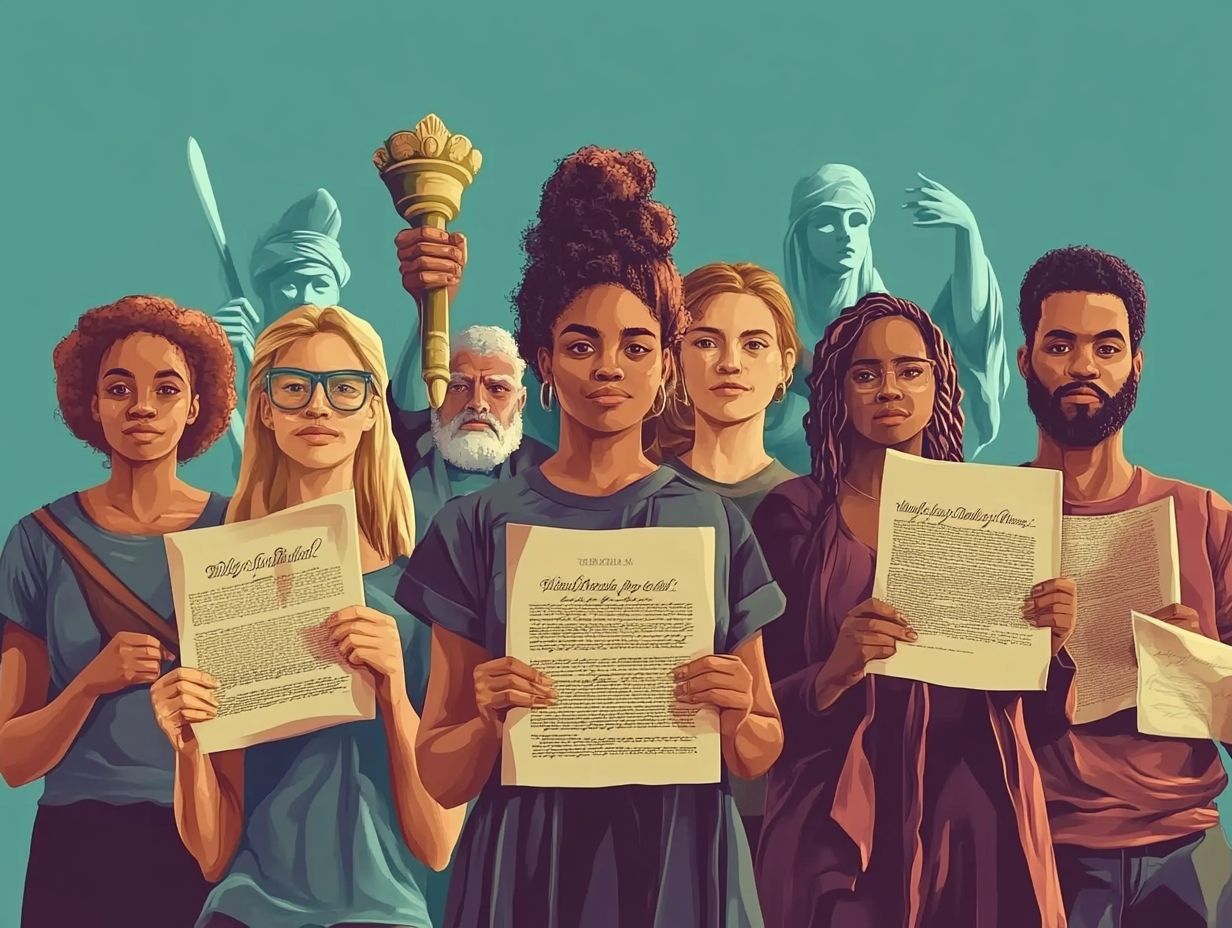
Clarifying misunderstandings about constitutional rights is crucial for enhancing your awareness and ensuring that you are well-informed about your civil rights and protections under the law.
Many individuals often conflate the right to free speech with the notion that they can say anything without facing consequences. They overlook the fact that this right has its boundaries, particularly regarding hate speech or incitement to violence.
For instance, while you may express dissent against government policies, making threats can certainly land you in legal trouble. Sometimes, you might misinterpret the protections against search and seizure as a blanket shield from police inquiries. However, specific legal precedents outline exceptions, like exigent circumstances situations where law enforcement can act quickly without a warrant due to immediate danger.
Understanding these nuances is vital, as they directly influence your experiences and interactions within the legal system.
Exercising Your Rights
Exercising your rights is a cornerstone of citizenship in the United States. It includes various activities, from advocacy and public assembly to the vital act of voting.
By engaging in these practices, you have the power to influence societal change and champion civil rights. It’s an essential part of making your voice heard!
How to Advocate for Your Rights
Advocating for your rights requires a deep understanding of the legal landscape and the smart use of resources to challenge discrimination laws while actively promoting civil rights in your community.
By familiarizing yourself with local advocacy groups, you gain access to a treasure trove of knowledge and support. Engaging with community organizations such as the American Civil Liberties Union or local legal aid services offers crucial guidance on navigating legal processes.
Participating in educational initiatives like workshops and seminars sharpens your awareness of civil rights issues, enabling you to take impactful action.
Whether you choose to volunteer, attend town hall meetings, or harness social media for awareness campaigns, these efforts not only amplify your voice but also fortify the community s collective resolve for justice and equality.
Frequently Asked Questions
What is the Constitution and why is it important?
The Constitution is the supreme law of the United States, outlining the fundamental principles and rights of its citizens. It is important because it establishes the framework for the government, protects the rights of individuals, and ensures a system of checks and balances.
What are my rights under the Constitution?
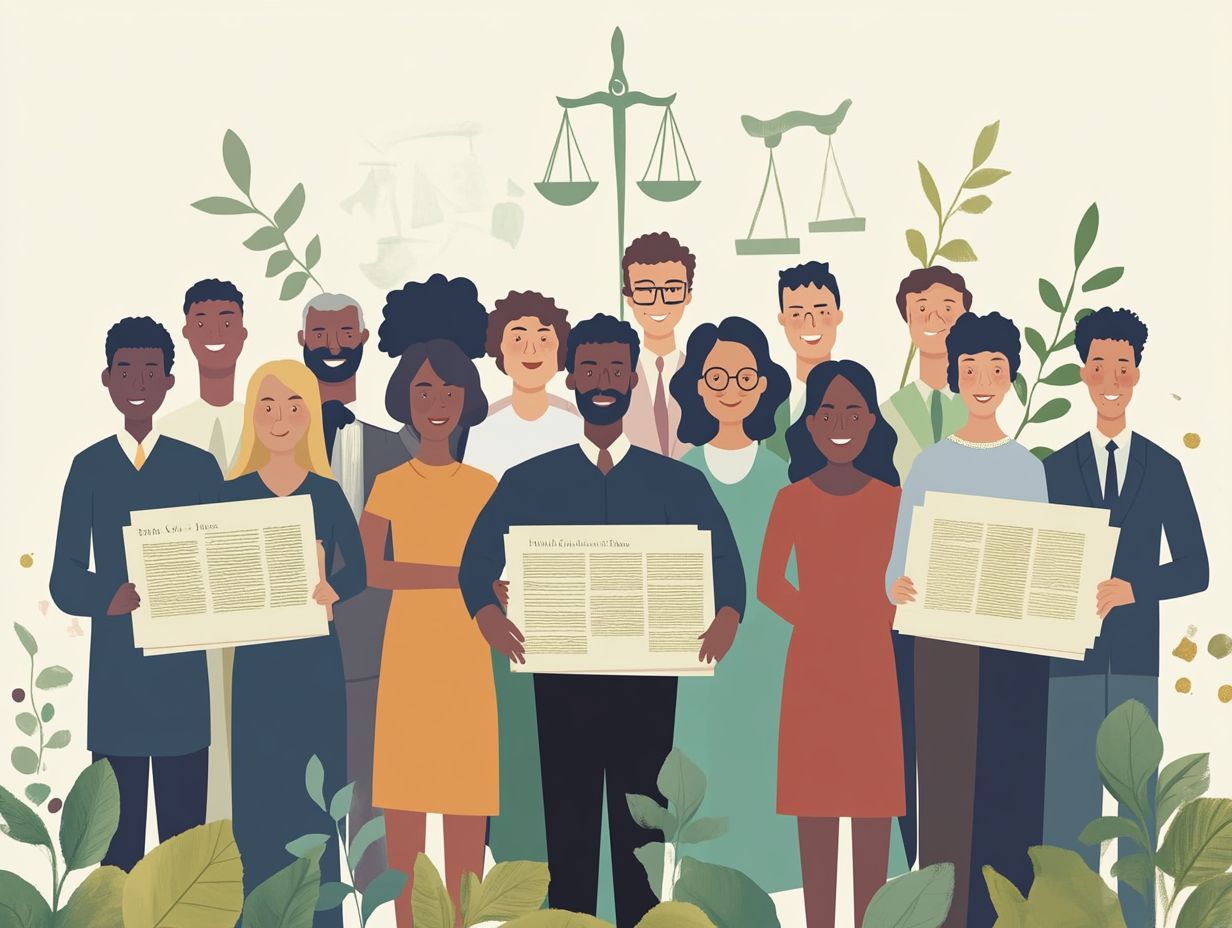
Your rights under the Constitution include the right to freedom of speech, religion, and press, the right to bear arms, the right to a fair and speedy trial, and protection from unreasonable searches and seizures.
What is the Bill of Rights?
The Bill of Rights is the first 10 amendments to the Constitution that were added to protect individual liberties and limit the power of the government.
Can my rights under the Constitution ever be taken away?
In most cases, no. The Constitution guarantees certain rights that cannot be taken away by the government. However, there are some exceptions, such as during times of war or national emergency.
How can I exercise my rights under the Constitution?
You can exercise your rights by being informed and knowledgeable about them, participating in the democratic process, and peacefully advocating for your beliefs and values.
What should I do if I feel my rights under the Constitution have been violated?
If you believe your rights have been violated, act quickly! Seek legal assistance from a lawyer or your local ACLU chapter. You can also file a complaint with the appropriate government agency or take part in a peaceful protest to bring attention to the issue.

